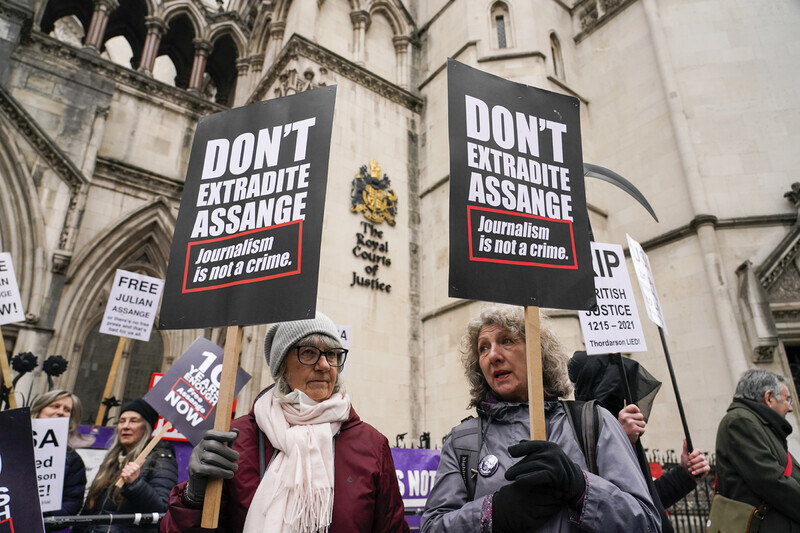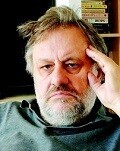hankyoreh
Links to other country sites 다른 나라 사이트 링크
[Column] Freedom for Ukraine... and for Assange


A news item passed largely unnoticed while our eyes have been mostly on the Ukraine war. On April 20, 2022, Julian Assange moved one step closer to being extradited to the United States, where he is set to be tried under the Espionage Act. A London court issued a formal extradition order in a hearing that day, leaving UK Home Secretary Priti Patel (the one who proposed sending refugees arriving in the UK to Rwanda) to rubber-stamp his transfer to the US. If convicted, Assange faces up to 175 years in prison.
So yes, we should fully support Ukrainian resistance. Yes, we should imagine what would have happened to Chelsea Manning if she were a Russian. But our Western freedom also has limits that we should never lose sight of.
We received a clear signal of this limit from Elon Musk who, apropos his offer to purchase Twitter, said in late April that he sees the acquisition as nothing less than a turning point for civilization — his goal is to ensure that Twitter remains a trusted platform for democracy. "My strong intuitive sense is that having a public platform that is maximally trusted and broadly inclusive is extremely important to the future of civilization," he said at the time.
Musk railed against what he saw as a lack of free speech on Twitter, and explained that his test for whether a platform adheres to free speech principles is simple: "Is someone you don't like allowed to say something you don't like? And if that is the case, then we have free speech."
The question is, again, what kind of world we live in in which only a private property (held by a single individual, in this case) of one of the main commons can guarantee freedom and democracy. In short, it is a world in which neo-feudalism presents itself as the safeguard of freedoms. One should also note that Musk defines “free speech” in the terms of “like / don’t like,” — i.e., in the terms of opinions that should be all treated as equal. What about truths concerning basic human rights, education, and healthcare?
What this means is that at this very moment when we are helping Ukrainians to defend freedom, we should be more attentive than ever to what this freedom is.
The finale of Act I of Mozart’s “Don Giovanni” begins with Don Giovanni’s powerful appeal to all present — “Viva la liberta!” — repeated forcefully by all, interrupting the melodic flow as if the music became stuck at this point of excessive engagement. But the catch is that although the entire group is enthusiastically unified around the call to freedom, each subgroup projects into “liberta” its own dreams and hopes. To quote Etienne Balibar, “Sociability is therefore the unity of a real agreement and an imaginary ambivalence, both of which have real effects.”
Imagine a situation of political unity where all sides unite under the same Master-signifier (“freedom”), but every particular group projects a different meaning into this universality: freedom of property for some, anarchic freedom outside the state law for others, social conditions which allow individuals to actualize their potentials for yet another group.
The contours of freedom are, of course, historically variable, which brings us to the profound historicity of the predominant notion of freedom: to simplify it to the utmost, in traditional societies freedom does not refer to equality — freedom means that each person should be free to play its specific role in the hierarchic order. In modern societies, freedom is linked to abstract legal equality and personal liberty (a poor worker and his rich employer are equally free). Starting in the mid-19th century, freedom became more and more linked to social circumstances which enabled people to actualize it, like minimal welfare, free education, and healthcare.
Today the accent is on the “freedom of choice” which implies that we ignore how the very frame of choices is imposed on individuals, which choices are de facto privileged, and so on. True freedom begins when we freely question the content of freedom.
Please direct questions or comments to [english@hani.co.kr]

Editorial・opinion
![[Column] Has Korea, too, crossed the Rubicon on China? [Column] Has Korea, too, crossed the Rubicon on China?](https://flexible.img.hani.co.kr/flexible/normal/500/300/imgdb/original/2024/0419/9317135153409185.jpg) [Column] Has Korea, too, crossed the Rubicon on China?
[Column] Has Korea, too, crossed the Rubicon on China?![[Correspondent’s column] In Japan’s alliance with US, echoes of its past alliances with UK [Correspondent’s column] In Japan’s alliance with US, echoes of its past alliances with UK](https://flexible.img.hani.co.kr/flexible/normal/500/300/imgdb/original/2024/0419/2317135166563519.jpg) [Correspondent’s column] In Japan’s alliance with US, echoes of its past alliances with UK
[Correspondent’s column] In Japan’s alliance with US, echoes of its past alliances with UK- [Editorial] Does Yoon think the Korean public is wrong?
- [Editorial] As it bolsters its alliance with US, Japan must be accountable for past
- [Guest essay] Amending the Constitution is Yoon’s key to leaving office in public’s good graces
- [Editorial] 10 years on, lessons of Sewol tragedy must never be forgotten
- [Column] A death blow to Korea’s prosecutor politics
- [Correspondent’s column] The US and the end of Japanese pacifism
- [Guest essay] How Korea turned its trainee doctors into monsters
- [Guest essay] As someone who helped forge Seoul-Moscow ties, their status today troubles me
Most viewed articles
- 1[Column] The clock is ticking for Korea’s first lady
- 2[Correspondent’s column] In Japan’s alliance with US, echoes of its past alliances with UK
- 3Samsung barricades office as unionized workers strike for better conditions
- 4After 2 months of delayed, denied medical care, Koreans worry worst may be yet to come
- 5[Column] Has Korea, too, crossed the Rubicon on China?
- 6[Editorial] When the choice is kids or career, Korea will never overcome birth rate woes
- 7Hong Se-hwa, voice for tolerance whose memoir of exile touched a chord, dies at 76
- 8US overtakes China as Korea’s top export market, prompting trade sanction jitters
- 9Constitutional Court rules to disband left-wing Unified Progressive Party
- 10Nearly 1 in 5 N. Korean defectors say they regret coming to S. Korea